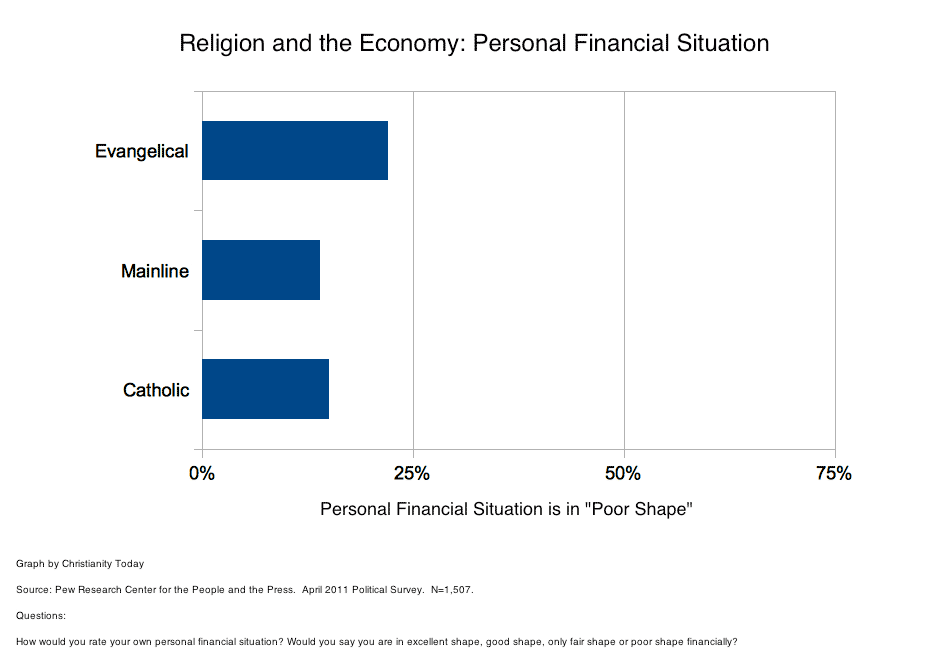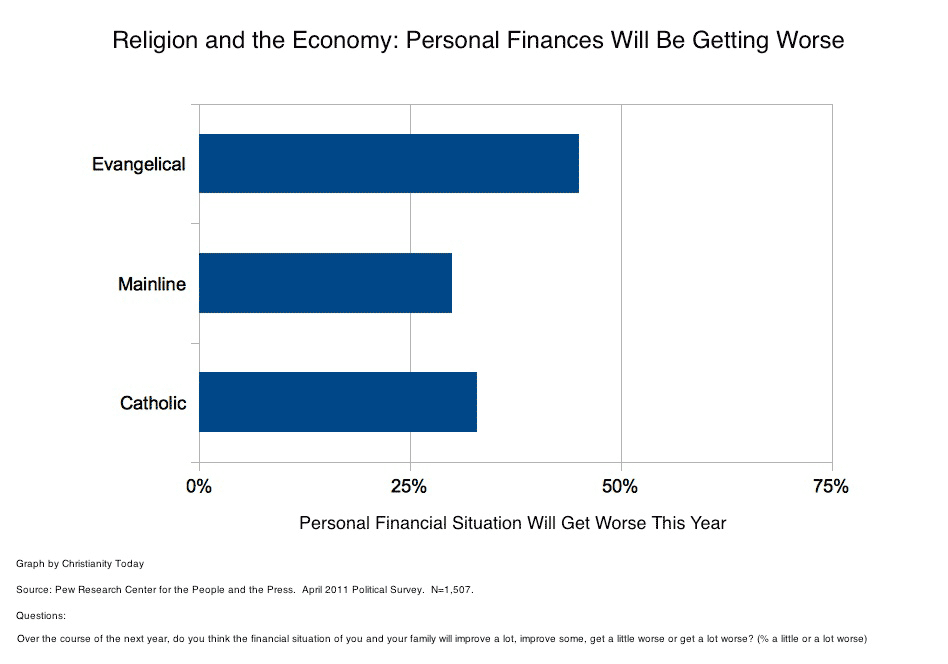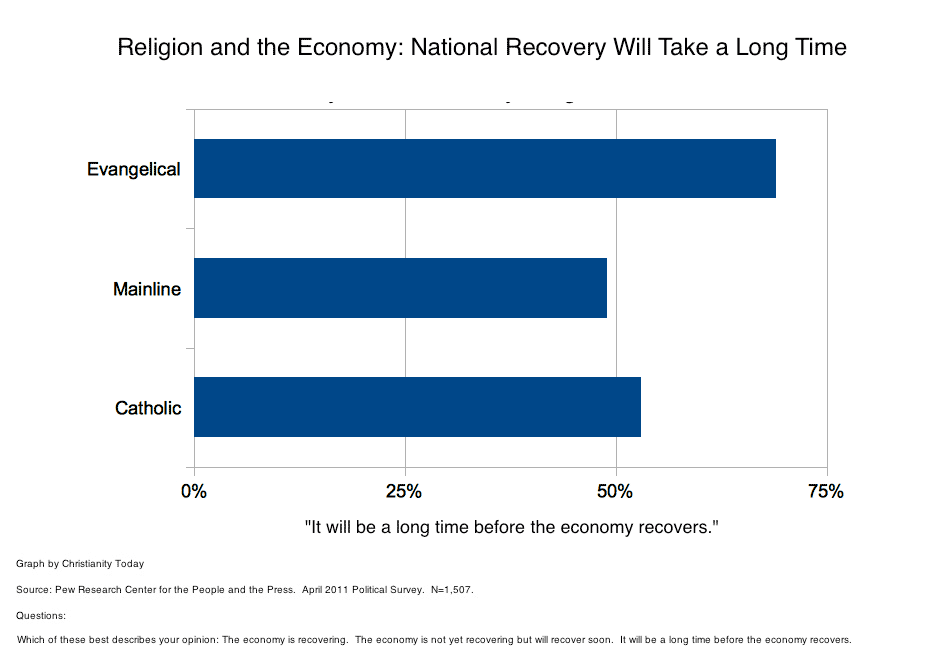President Obama will send his new jobs bill to Congress today, the recommendations he pushed during his address to a joint session of Congress last Thursday. The bill would direct more than $400 billion to programs the President hopes will improve the nation’s unemployment, which remains stubbornly high.
The most recent political poll by the Pew Research Center for the People and the Press finds only seven percent of Americans say the economy is doing well. And the views of many evangelicals are more pessimistic than those of other Americans. But the economic perceptions are just that—perceptions.
Pew’s April poll asked several questions about both personal finances and the national economy. When asked about their personal finances, few Americans say that their situation is poor. White evangelicals, however, stand out as having a worse view of their own finances, almost twice as likely as mainline Protestants to have a poor financial situation.
 A Dallas-area megachurch has decided to escrow Cooperative Program funds temporarily in order to evaluate future support of Southern Baptist Convention (SBC) causes.
A Dallas-area megachurch has decided to escrow Cooperative Program funds temporarily in order to evaluate future support of Southern Baptist Convention (SBC) causes.
At issue are what the congregation calls “various significant positions taken by the leadership of the Ethics and Religious Liberty Commission [ERLC] that do not reflect the beliefs and values of many in the Southern Baptist Convention,” according to a statement the church released to Louisiana’s Baptist Message.
Prestonwood Baptist Church in Plano, Texas, will escrow what would amount to million annually, the Message reported Thursday.
[Editor’s note: Within the SBC, individual churches give to the Cooperative Program each year as a way of funding state conventions and denominational agencies and seminaries. Prestonwood, one of the biggest churches in the SBC, gave 0,000 to the Cooperative Program in 2015. The state convention splits the funding with the SBC, with 45 percent staying in Texas and 55 percent going to national ministry and missions.]
In a text to Baptist Press, Message editor Will Hall noted he had queried Prestonwood about its giving to SBC causes after pastor Jack Graham was interviewed in December by The Wall Street Journal (WSJ). Graham told the newspaper that the church was “considering making major changes in our support of the Southern Baptist Convention.”
At issue, Graham said in the interview, was alleged “disrespectfulness” by ERLC president Russell Moore toward evangelical supporters of Donald Trump during the 2016 presidential campaign.
Moore, who publicly opposed Trump during the primary and general election cycles, said in a December blog post he never intended to criticize all evangelicals who supported Trump.
Graham is a former SBC president and a member of Trump’s evangelical executive advisory board.
Some Southern Baptists also have criticized the ERLC for joining a friend of the court brief last May in support of a New Jersey Islamic society’s right to build a mosque. The International Mission Board (IMB) joined the brief as well, and president David Platt apologized Wednesday for the divisive nature of the action.
Graham told Baptist Press via text message that Prestonwood is engaging in “an internal evaluation” of its giving, “and our desire is not to seek publicity so we can make the right decision for our church and Southern Baptists.”
Asked whether Prestonwood also will escrow funds for the Southern Baptists of Texas Convention (SBTC)—the state convention with which it cooperates—Graham responded, “We're evaluating everything.”
Graham told the Message he is “not angry at the SBC, and neither are our people, and I'm not working to start a movement to fire anyone.” He wants Prestonwood to remain “a cooperating partner [with the SBC] as we have been for many years,” but cited “uneasiness” among church leaders about the “disconnect between some of our denominational leaders and our churches.”
SBTC executive director Jim Richards told Baptist Press in a statement:
In our fellowship of churches, Prestonwood Baptist Church has been a faithful ministry partner for many years. We love Jack Graham and his people. It is our hope that these concerns can be resolved in a way that strengthens the kingdom work of Southern Baptists and honors the autonomy of the local church. We stand ready to assist as we have opportunity.
Moore told Baptist Press in a statement, “I love and respect Jack Graham and Prestonwood Baptist Church. This is a faithful church with gifted leaders and a long history of vibrant ministry working and witnessing for Christ.”
Following Prestonwood’s announcement, a Texas pastor who serves on the ERLC’s Leadership Council, Bart Barber, tweeted, “I love and appreciate” Jack Graham “but am an ardent advocate for #ReligiousLiberty and for [the Cooperative Program]. I’m just heartbroken & conflicted.”
In related news, First Baptist Church in Morristown, Tennessee, announced last month it would escrow funds traditionally given through the Cooperative Program over concerns related to ERLC and IMB participation in the New Jersey mosque brief. Its pastor, Dean Haun, resigned as an IMB trustee in November over the brief.
Louisiana Baptist Convention executive director David Hankins and former SBC Executive Committee chairman Bill Harrell both told the WSJ that they know of churches considering a diversion of funds away from the ERLC.
Threats to escrow Cooperative Program funds have occurred periodically in SBC history. In the mid-1980s, some Southern Baptist conservatives threatened to escrow Cooperative Program funds if moderates regained control of the convention presidency, Baptist Press reported.
Moreover, evangelicals are much more pessimistic that this situation will improve. Pew asked Americans if their personal financial situations would improve or get worse. Among mainline Protestants and Catholics, a response of hope still outnumbers despair. Nearly half of evangelicals believe their financial situation will get worse over the course of the next year.
 A Dallas-area megachurch has decided to escrow Cooperative Program funds temporarily in order to evaluate future support of Southern Baptist Convention (SBC) causes.
A Dallas-area megachurch has decided to escrow Cooperative Program funds temporarily in order to evaluate future support of Southern Baptist Convention (SBC) causes.
At issue are what the congregation calls “various significant positions taken by the leadership of the Ethics and Religious Liberty Commission [ERLC] that do not reflect the beliefs and values of many in the Southern Baptist Convention,” according to a statement the church released to Louisiana’s Baptist Message.
Prestonwood Baptist Church in Plano, Texas, will escrow what would amount to million annually, the Message reported Thursday.
[Editor’s note: Within the SBC, individual churches give to the Cooperative Program each year as a way of funding state conventions and denominational agencies and seminaries. Prestonwood, one of the biggest churches in the SBC, gave 0,000 to the Cooperative Program in 2015. The state convention splits the funding with the SBC, with 45 percent staying in Texas and 55 percent going to national ministry and missions.]
In a text to Baptist Press, Message editor Will Hall noted he had queried Prestonwood about its giving to SBC causes after pastor Jack Graham was interviewed in December by The Wall Street Journal (WSJ). Graham told the newspaper that the church was “considering making major changes in our support of the Southern Baptist Convention.”
At issue, Graham said in the interview, was alleged “disrespectfulness” by ERLC president Russell Moore toward evangelical supporters of Donald Trump during the 2016 presidential campaign.
Moore, who publicly opposed Trump during the primary and general election cycles, said in a December blog post he never intended to criticize all evangelicals who supported Trump.
Graham is a former SBC president and a member of Trump’s evangelical executive advisory board.
Some Southern Baptists also have criticized the ERLC for joining a friend of the court brief last May in support of a New Jersey Islamic society’s right to build a mosque. The International Mission Board (IMB) joined the brief as well, and president David Platt apologized Wednesday for the divisive nature of the action.
Graham told Baptist Press via text message that Prestonwood is engaging in “an internal evaluation” of its giving, “and our desire is not to seek publicity so we can make the right decision for our church and Southern Baptists.”
Asked whether Prestonwood also will escrow funds for the Southern Baptists of Texas Convention (SBTC)—the state convention with which it cooperates—Graham responded, “We're evaluating everything.”
Graham told the Message he is “not angry at the SBC, and neither are our people, and I'm not working to start a movement to fire anyone.” He wants Prestonwood to remain “a cooperating partner [with the SBC] as we have been for many years,” but cited “uneasiness” among church leaders about the “disconnect between some of our denominational leaders and our churches.”
SBTC executive director Jim Richards told Baptist Press in a statement:
In our fellowship of churches, Prestonwood Baptist Church has been a faithful ministry partner for many years. We love Jack Graham and his people. It is our hope that these concerns can be resolved in a way that strengthens the kingdom work of Southern Baptists and honors the autonomy of the local church. We stand ready to assist as we have opportunity.
Moore told Baptist Press in a statement, “I love and respect Jack Graham and Prestonwood Baptist Church. This is a faithful church with gifted leaders and a long history of vibrant ministry working and witnessing for Christ.”
Following Prestonwood’s announcement, a Texas pastor who serves on the ERLC’s Leadership Council, Bart Barber, tweeted, “I love and appreciate” Jack Graham “but am an ardent advocate for #ReligiousLiberty and for [the Cooperative Program]. I’m just heartbroken & conflicted.”
In related news, First Baptist Church in Morristown, Tennessee, announced last month it would escrow funds traditionally given through the Cooperative Program over concerns related to ERLC and IMB participation in the New Jersey mosque brief. Its pastor, Dean Haun, resigned as an IMB trustee in November over the brief.
Louisiana Baptist Convention executive director David Hankins and former SBC Executive Committee chairman Bill Harrell both told the WSJ that they know of churches considering a diversion of funds away from the ERLC.
Threats to escrow Cooperative Program funds have occurred periodically in SBC history. In the mid-1980s, some Southern Baptist conservatives threatened to escrow Cooperative Program funds if moderates regained control of the convention presidency, Baptist Press reported.
Like other Americans, evangelicals view the economic situation as dire. Less than 10 percent of Americans of any religion believe the economy is on sound footing. About half of Americans also believe that the economy is not recovering and will not recover for a long time. Evangelicals appear more pessimistic than most Americans. More than two-thirds of evangelicals said that it will be a long time before the U.S. economy recovers.
 Stewart F. House / Getty
Stewart F. House / Getty
These perceptions of the economy are unlikely to be due to particular religious beliefs. Instead, the survey results suggest evangelicals see the economy differently due to a combination of partisanship and lower income levels. Public opinionresearch finds that people are more bullish about the economy when their party is in power. With a Democrat in the White House, Republicans will tend to view the economy as weaker than Democrats (the opposite pattern would occur with a Republican President). In the survey, 71 percent of evangelicals identified as Republicans or independents who favor the Republican party (49 percent identified as Republican; another 22 percent were independents who lean toward the Republican party).
Evangelicals may be affected in different ways by the economy than other Americans. In the same poll, evangelicals were more likely to say that their personal finances were affected by inflation and rising gas prices. One reason: evangelicals in this survey, on average, have lower incomes than other Americans. This income difference accounts for most of the differences in economic perceptions, according to the poll.
Regardless of reasons, evangelicals look at the economy differently than others, while some political activists criticize the current debate over the economy and jobs.
Family Research Council president Tony Perkins said both Republican and Democratic proposals need to include a discussion of the family.
“As the merits of these economic proposals are debated, there must be a realization that our nation’s economic decline will not be reversed until we address the elephant in the room—the breakdown of the family,” Perkins said. “The best economic program is the two parent family with children. These families will raise children who will drive our nation’s future productivity which must steadily increase if we are to reverse economic decline.”
Margaret Benefiel, writing on Sojourners‘s God’s Politics blog, said there are “no easy answers” for the economy.
“We will need to experiment. We will need to hear opposing perspectives, listening for the wisdom in other points of view,” Benefiel said. “We will need to work together across party lines for the good of all, rejecting entrenched, knee-jerk responses. We will need to find a new way forward.”
Editor’s Note: Data from the April Political Survey is publicly available. Results are based on Christianity Today’s analysis of this data. CT is responsible for all analysis and interpretation of the results. Pew identifies evangelicals as white, non-Hispanic Protestants who described themselves as “born-again or evangelical.” Around 18 percent of Americans are evangelicals by this definition. The margin of error for each religious group is larger than for the sample as a whole. The results are descriptive; religious differences could be due to partisanship, ideology, income, or other factors.
Copyright © 2011 Christianity Today. Click for reprint information.
Related Elsewhere:
Previous Christianity Today coverage of the economy includes:
Ayn Rand: Goddess of the Great Recession | Why Christians should be wary of the late pop philosopher and her disciples. (August 27, 2010)
It Takes More Than a Recession to End Consumption | Though it’s no longer conspicuous, ‘feel-good’ buying lives on in the U.S. (February 12, 2009)
Music in Recession | Can the Christian music industry survive the economic storm? (June 2, 2009)
Recession and Religiosity Redux | Do evangelical churches see more members during a recession? (January 2, 2009)
CT covers political developments on the politics blog.








